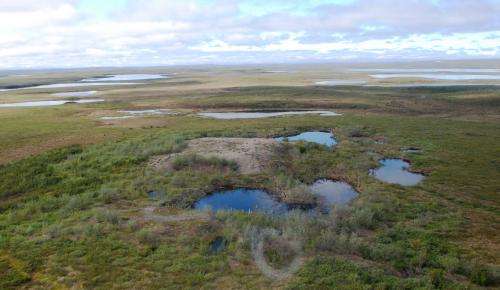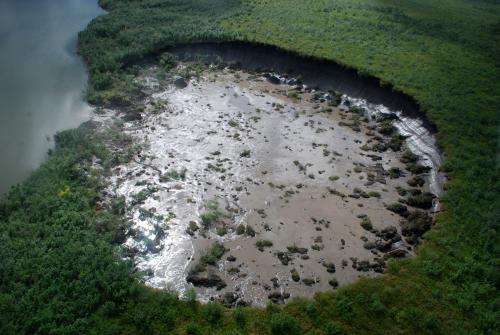Drilling for hydrocarbons can impact aquatic life

The degradation of drilling sumps associated with hydrocarbon extraction can negatively affect aquatic ecosystems, according to new research published November 6th in the open-access journal PLOS ONE by Joshua Thienpont and colleagues at Queen's University and other institutions.
Hydrocarbons are a primary source of energy as combustible fuel. Although hydrocarbon exploration and extraction are profitable enterprises, hydrocarbons contribute to the formation of greenhouse gases and are therefore a major stressor to the environment.
During the process of exploring for hydrocarbons, drilling sumps are used to permanently store the waste associated with drilling. In the Mackenzie Delta region of Canada's western Arctic, more than 150 drilling sumps were constructed for this purpose. Although the areas surrounding the sumps were believed to be frozen by the surrounding permafrost, recent findings suggest that these areas may actually be thawing. In this study, the authors examine the environmental effects of this type of drilling sump containment loss in the Mackenzie Delta.
Because drilling fluids are saline, they tested whether leakage to surface waters was occurring by measuring changes in conductivity, as saline is more conductive than pure water. They also hypothesized that if saline-rich wastes from drilling sumps were impacting lakes, there should be changes in the types of life forms present. Zooplankton, for example, are a key component of aquatic ecosystems and various species survive differently in saline versus fresh water.

Through an analysis of lake sediments, they found changes in the community composition of zooplankton due to sump degradation. These results suggest that climate change and permafrost thaw can have deleterious consequences to aquatic life through the degradation and leaking of drilling sumps.
Thienpont elaborates, "The leaching of wastes from drilling sumps represents a newly identified example of one of the cumulative impacts of recent climate change impacting the sensitive freshwater ecosystems of the Arctic."
More information: Thienpont JR, Kokelj SV, Korosi JB, Cheng ES, Desjardins C, et al. (2013) Exploratory Hydrocarbon Drilling Impacts to Arctic Lake Ecosystems. PLoS ONE 8(11): e78875. DOI: 10.1371/journal.pone.0078875
Journal information: PLoS ONE
Provided by Public Library of Science




















